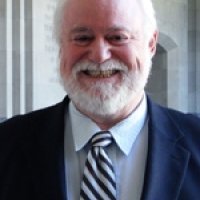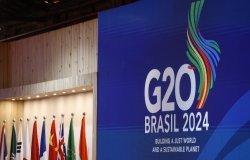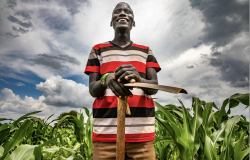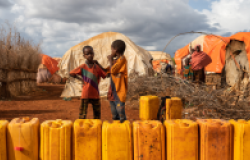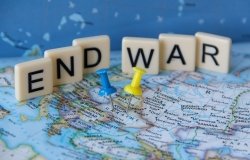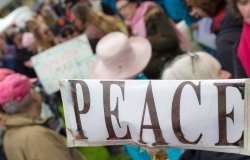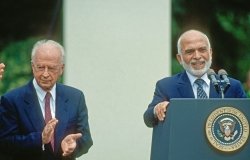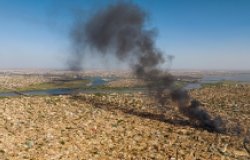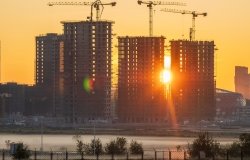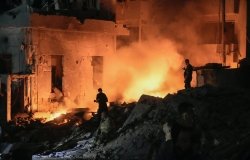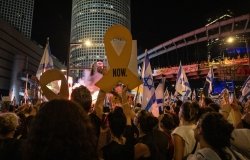DRC Update: Overview on Security and Development by Prime Minister Matata Ponyo Mapon
This event featured remarks from the Democratic Republic of the Congo’s Prime Minister, H.E. Matata Ponyo Mapon, on matters regarding the country’s security and path to development. This discussion also featured Cynthia Akuetteh, Deputy Assistant Secretary of State for African Affairs as a panelist.
Overview
Moving Forward: The Future of the DRC
Both Prime Minister Matata and Deputy Assistant Secretary Akuetteh’s comments demonstrated that, although the DRC has made progress in reforming its economic sector, there is much work to be done in terms of governance and security issues. Moreover, both agreed that the international community is essential to assuring the continued development of the Congo and its cooperation with its neighbors. In sum, insecurity in DRC, especially in the East, will continue to present challenges to the country and will only be ameliorated if all stakeholders in the crisis are willing to establish a concrete framework to diplomatically and militarily quell regional threats.
Steve McDonald, Director of the Africa Program and the Project on Leadership and Building State Capacity, Wilson Center: We welcome you here to the Wilson Center for this important event to hear His Excellency, the Prime Minister, speak to us about the current situation in the Democratic Republic of Congo (DRC) and to give us an update of things that are happening there. The Woodrow Wilson Center is very happy to be able to host this event since, quite simply, what we try to do at the Center is to bring together the world of ideas and the world of policy, something Woodrow Wilson himself believed in, and these are indeed the very kind of events that do just that.
In January 2006, the Wilson Center established the Initiative for Cohesive Leadership (ILC) in Kinshasa, a partnership that has conducted training workshops in a variety of places throughout the Congo that have involved over 800 individual leaders from both the political class and civil society and have included leaders of national and provincial influence, militia and community leaders across ethnic and political affiliations. Our ultimate goal through this Initiative has been to strengthen leadership skills and national cohesion within the Congolese government. 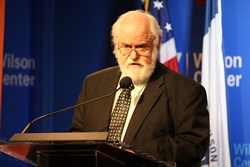 By building trust and understanding of their interdependence and building their collaborative capacity, country leaders we have worked with have gained enhanced communication and problem-solving skills, as well as a freshly understood common purpose that will allow them to start positively impacting their respective environments and constituencies on both a local and a national level. Of course it is left to the participants to define the burning issues pertaining to their country and to spell out their respective and collective engagements, so they can begin to address the challenges to development and recovery that face their country.
By building trust and understanding of their interdependence and building their collaborative capacity, country leaders we have worked with have gained enhanced communication and problem-solving skills, as well as a freshly understood common purpose that will allow them to start positively impacting their respective environments and constituencies on both a local and a national level. Of course it is left to the participants to define the burning issues pertaining to their country and to spell out their respective and collective engagements, so they can begin to address the challenges to development and recovery that face their country.
You, in fact, Mr. Prime Minister have worked with the ILC in the past on several initiatives. While, overall, the ILC’s activities have been successful so far, many challenges lie ahead for the Democratic Republic of Congo and these are the challenges that we will be discussing today. As an organization committed to the Congo and a brighter future for the Congo, the Wilson Center and the ILC welcome the opportunity to host you, sir, and would like to continue to work with you in the future to confront the many socio-political obstacles facing your country.
Growth amid Instability: The Economic Progress of the DRC
H.E. Matata Ponyo Mapon, Prime Minister, Democratic Republic of the Congo: Ladies and gentlemen, good afternoon and thank you for this invitation to discuss the problems that confront the development of the Democratic Republic of the Congo. The first point that I am going to discuss is the economic performance of the DRC. Secondly, I will attempt to define what is currently inhibiting my country’s economic progress. And the third question that I would like to tackle is the armed conflicts that are currently supported by our neighbors and prevent the development of the DRC.
Regarding economic performance, I would like to tell you all that today the DRC is experiencing quite a remarkable economic resurgence. In terms of economic stabilization, we are bringing down the inflation rate that has historically weakened our country. In 2012, for example, we experienced an inflation rate of 2.7 percent, the lowest rate in over 30 years as well as a nominal Gross Domestic Product (GDP) growth of 7.2 percent, while the population only increased by around 3 percent. Therefore, this growth is, overall, positive.
In 2013, while the year has only started, we estimate the nominal GDP growth to increase to 8.3 percent and the population to increase by 3 percent. In 2014, we expect to greatly surpass these economic growth figures. The progress that we are now seeing, in terms of structural and economic reform will be maintained if these efforts produce the expected results, thereby allowing our country to surpass previous economic projections.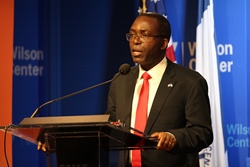 Economic growth manifests, most noticeably, from the revival of physical infrastructure as it is capable of connecting the DRC’s 2.3 million square kilometers. The hospitals are currently being renovated and schools are being constructed or rebuilt, as well. We must acknowledge that this macroeconomic stability is quite exceptional. In terms of currency, the Congolese franc is on par with the U.S. dollar.
Economic growth manifests, most noticeably, from the revival of physical infrastructure as it is capable of connecting the DRC’s 2.3 million square kilometers. The hospitals are currently being renovated and schools are being constructed or rebuilt, as well. We must acknowledge that this macroeconomic stability is quite exceptional. In terms of currency, the Congolese franc is on par with the U.S. dollar.
Internal Conflict and the Challenges to Development
However, our economic efforts are nonetheless impaired by security issues. Several researchers have shown that there is a relationship, a causal connection between security and economic growth. All the results that I mention have happened in spite of the security challenges, especially in the East and in North Kivu. This insecurity does not allow the government to do what is necessary to improve the living conditions in that part of the country. This insecurity also takes away important resources that were meant to go towards the improvement of social conditions in the country.
This war started in February of 2012 and we have already spent more than 150 million U.S. dollars (USD) which were directed towards military operations there. One can imagine that if this $150 million could be directed towards development projects, the living conditions of our people would improve greatly. These military operations prevented us from moving forward with the Millennium Development Goals, which you know are giving us a metric to measure the social conditions of the population. To be sure, this war in the East is a war that is damaging and preventing us from progress.
The Role of Rwanda
Different studies led by experts from the UN at the prompting of the Security Council [have concluded that] the armed group in the East was armed by our neighbor, Rwanda. For us, this report from the UN is a professional report, a serious report, and it is important for the international community [and] the U.S. to take into account this dramatic, serious situation where a rebellion is fomented by a country that has the support of the international community.  What I am saying is explained in a report made by a panel of experts from the UN. It is important to be able to say that the international community must examine carefully the causes of this insecurity, because it causes human circumstances that are impossible to accept. Women are killed and children are enlisted into wars and armies and we must bring this situation to an end. Another medium for insecurity in the DRC is the external exploitation of the mining industry, as some of the Congo’s neighboring countries continue to export mining resources beyond their actual capacities for production. The experts from the UN have identified the origin of this rebellion and point their fingers at Rwanda. Between 2010 and 2011, Rwanda exported more than 4,000 tons of minerals; that is more than the production capacity of that country. Rwanda also exported more than 4,000 tons of cotton, which again is beyond its production capacity. Rwanda exports more than it produces; therefore, in this context, it seems that rebellion and insecurity favor those countries’ economies that are also supported by the international community.
What I am saying is explained in a report made by a panel of experts from the UN. It is important to be able to say that the international community must examine carefully the causes of this insecurity, because it causes human circumstances that are impossible to accept. Women are killed and children are enlisted into wars and armies and we must bring this situation to an end. Another medium for insecurity in the DRC is the external exploitation of the mining industry, as some of the Congo’s neighboring countries continue to export mining resources beyond their actual capacities for production. The experts from the UN have identified the origin of this rebellion and point their fingers at Rwanda. Between 2010 and 2011, Rwanda exported more than 4,000 tons of minerals; that is more than the production capacity of that country. Rwanda also exported more than 4,000 tons of cotton, which again is beyond its production capacity. Rwanda exports more than it produces; therefore, in this context, it seems that rebellion and insecurity favor those countries’ economies that are also supported by the international community.
Territorial Integrity and Further Talks with M23
I want to tell you that the President of the Democratic Republic of Congo is beholden to the idea of the territorial integrity of our entire country and peace in the East. He also cares very much about the integrity of the operations. It is inconceivable that the international community tolerates the situation that has been identified by the UN.
As for the negotiations in Kampala and Addis Abba – we want these negotiations to be supported by all great political powers in the world, in particular the U.S. We believe that the success of these talks and the official and transparent support of the international community will directly contribute to the sustained successes of our economy. I thank you very much.
The U.S. Position on the Situation in the Congo
Cynthia Akuetteh, Deputy Assistant Secretary of State for African Affairs, U.S. Department of State: Let me thank the Wilson Center for organizing this program; we have a very good collaboration and we’re especially appreciative of the opportunity you gave Assistant Secretary Carson a couple of weeks ago to outline our policy towards Africa and towards the DRC. As the Assistant Secretary said in his testimony to Congress in December, “the security and humanitarian situation in the DRC is the most volatile and violent in Africa today. The people of North and South Kivu provinces have faced repeated cycles of conflict, atrocities, and displacement, with the current crisis simply being the latest iteration.” 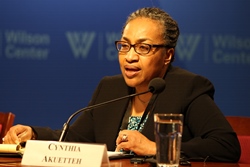 And to underscore our very deep concern about the situation, the highest levels of the U.S. Government have engaged the parties in the conflict and will remain engaged. We support a political dialogue with all relevant actors in pursuit of a permanent solution to the root causes of the conflict and end instability in the region. We’re hopeful that the UN and regional mediation efforts that are now underway will bear fruit. However, once a regional framework agreement has been signed, the real road to progress lays ahead. The parties will need to engage seriously to identify and implement concrete measures to [enact] the principles contained in the framework agreement. Political will is absolutely necessary.
And to underscore our very deep concern about the situation, the highest levels of the U.S. Government have engaged the parties in the conflict and will remain engaged. We support a political dialogue with all relevant actors in pursuit of a permanent solution to the root causes of the conflict and end instability in the region. We’re hopeful that the UN and regional mediation efforts that are now underway will bear fruit. However, once a regional framework agreement has been signed, the real road to progress lays ahead. The parties will need to engage seriously to identify and implement concrete measures to [enact] the principles contained in the framework agreement. Political will is absolutely necessary.
It is in the interest of all the Congo’s closest neighbors to support a stable and sovereign DRC. The world is too interconnected and we all feel our neighbors’ pains and we are all responsible for the progress our neighbors make: peace in the Congo benefits everyone around it. A peaceful solution to the current conflict will create a secure atmosphere for good governance, economic growth, investment, and development.
Promoting the DRC’s Internal Capacity
While these regional efforts are necessary, the DRC Government itself has important challenges to resolve to achieve the sustained peace and stability, particularly in the reform of the security sector and the extension of effective governance to the eastern part of the DRC. The DRC Government has already made some significant economic and financial reforms – and we give much of that credit to the Prime Minister – to improve its potential for economic growth and develop a better quality of life for its citizens. Many of the reforms are attributable to the Prime Minister’s efforts. Under his leadership, the DRC has cut inflation, stabilized its currency, revitalized cooperation with the international donor community, instituted mobile banking and direct payment systems to reduce the risk of corruption in payment of civil servant salaries, and improved the business climate. This has been particularly important in terms of payments to the military. This has been part of the problem in terms of the conflict in eastern DRC – the role of the military – so mobile payment systems are a very important step towards security sector reform.
The United States greatly values the cooperation with P.M. Matata and the entire Government of the Democratic Republic of the Congo. We were very pleased when the President appointed you to the position of Prime Minister in April of last year. He also retains his appointment as Finance Minister and we look forward to the continuing reforms under your leadership. Thank you. End of Transcript.
The Problems in the East: Perspectives from the DRC’s Neighbors
During the Q/A portion of the discussion, the Prime Minister was asked by the Ambassador of the Central African Republic to the United States, H.E. Stanislas Moussa-Kembe, if he would be able to “explain in more detail the sociopolitical administrative structures that are in place for assuring that the population [in the East of the DRC] is secure in its development and security,” considering that democratic norms in this region are threatened by the lack of territorial integrity. In response, H.E. Matata reiterated that his country only continues to have problems with one of its neighbors, Rwanda, and it is that relationship’s dysfunction that threatens territorial integrity in the East. Consequently, he remarked that “insecurity in the eastern part of the DRC is basically due to the presence of foreign-backed rebel forces.” “How can the DRC army,” the Prime Minister posited, “ensure security at its borders with eight countries, and yet the same army cannot assure security at the border of only one country?” In essence, H.E. Matata sees the DRC’s contentious relations with Rwanda as the main factor undermining the army’s efficacy in ensuring peace.
Similarly, H.E. Seydou Bouda, the Ambassador of Burkina Faso to the United States, asked the Prime Minister if he could further elaborate on the historic causes of the DRC’s instability “because one cannot imagine that DR Congo, in its current situation, is aggressed by outside forces [without] internal catalyzers that favor external aggressions.”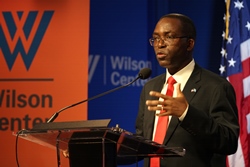 In response, Prime Minister Matata admitted that his country was founded on unstable democratic norms. However, the side effects of this were not seen in the DRC’s army, on the contrary, his country’s military was once an undeniable force in the region. Unfortunately, the prevalence of insurgent groups throughout the country has sapped the army’s effectiveness. As a result, under the leadership of President Joseph Kabila, the DRC has decided to pursue stability through economic progress and is now trying to rebuild the army his administration inherited and promote cohesion within the nation’s security force.
In response, Prime Minister Matata admitted that his country was founded on unstable democratic norms. However, the side effects of this were not seen in the DRC’s army, on the contrary, his country’s military was once an undeniable force in the region. Unfortunately, the prevalence of insurgent groups throughout the country has sapped the army’s effectiveness. As a result, under the leadership of President Joseph Kabila, the DRC has decided to pursue stability through economic progress and is now trying to rebuild the army his administration inherited and promote cohesion within the nation’s security force.
Finally, H.E. James Kimonyo, the Ambassador of Rwanda to the United States, addressed the Prime Minister directly concerning the relationship between his country and the DRC. Having had the opportunity to participate in bilateral engagements with the Congolese government, regional initiatives that have focused on the area’s instability, as well as United Nations forums on the subject, the Ambassador was incredulous regarding the Prime Minister’s interpretation of the crisis. He credited Ambassador Bouda for having mentioned how this issue needed more historical perspective. He believes that his government, in light of the common insecurity posed by the cross-border threat of the Forces démocratiques de libération du Rwanda (FDLR), has taken several steps to ensure cooperation with the government in Kinshasa on how to best address the issue. “This is the reason why in 2009 we were able to sit down and come up with a joint operation [agreement] that would allow us to eliminate this [threat] that persists in the eastern part of Congo.” As a result, the two countries were able to enjoy relative political, security, and economic peace from 2009 to 2012. However, this is no longer the case. The Ambassador expressed his frustrations as the same issues that confronted both governments in 2009 reemerged when the Mouvement du 23 Mars (M23) seized Goma and created a “security vacuum” in the region that, once again, was exploited by the FDLR. H.E. Kimonyo concluded his comments by reiterating to the Prime Minister that, “whenever there is crisis in eastern Congo, Rwanda is also affected,” and that the only way that tensions can be eased between the two neighbors is to establish a concrete framework for cooperation through which each is able to effectively eliminate their respective and collective security threats. In response, the Prime Minister urged Ambassador Kimonyo to read the United Nations Panel of Experts report on Rwanda’s involvement in the security crisis in the Congo. “The view of the Congo is that of the United Nations,” H.E. Matata reiterated, and that is why his government places so much importance on Rwanda’s role in the insecurity in the East.
Speakers
Hosted By

Africa Program
The Africa Program works to address the most critical issues facing Africa and US-Africa relations, build mutually beneficial US-Africa relations, and enhance knowledge and understanding about Africa in the United States. The Program achieves its mission through in-depth research and analyses, public discussion, working groups, and briefings that bring together policymakers, practitioners, and subject matter experts to analyze and offer practical options for tackling key challenges in Africa and in US-Africa relations. Read more
Thank you for your interest in this event. Please send any feedback or questions to our Events staff.
